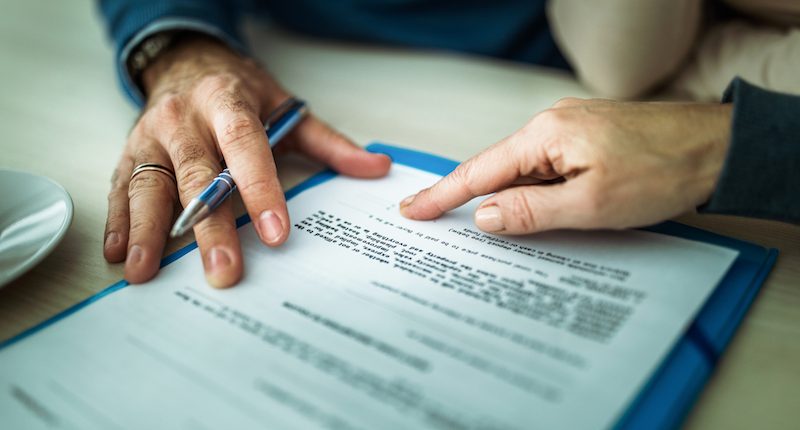Estate Planning Tips in a COVID-19 Economy

As COVID-19 continues to spread, the impact has affected everything and everyone daily. It’s important to prepare for the worse by reviewing your financial assets.
Here are helpful estate planning tips to get started!
Introduction
In a world where the fear of COVID-19 remains ever present, focusing on anything but immediate survival and sanity can be challenging. But leaving important topics like estate planning until it’s too late to address them is risky. This is especially true in a world where any of us could come down with a potentially fatal disease at any time.
If you haven’t paid much attention to estate planning in the past, there’s no better time than right now to get started. But even if you’ve had a plan in place for years, you may need to make adjustments to compensate for our current economy.
We’ll tell you how to do that, and what you need to consider, right now.
Talk About It
This is the most important point anyone can ever make about estate planning. While it can be difficult to discuss your eventual death with loved ones – or the death of a spouse, adult child, or dependent – these conversations must happen before a tragic event actually occurs. Otherwise, you or your loved ones could be left scrambling to make decisions on your behalf without knowing your final wishes.
Conversations about estate planning don’t have to be stressful, either. Sit down with someone you love and open a dialogue. Talk about what might happen if either of you is incapacitated by COVID-19, whether or not you want healthcare staff to use extraordinary measures to save your life, and if either of you should have a power of attorney to grant access to financial accounts in the event of an emergency.
These questions might feel awkward at first. This is normal! Just remember that having this information ensures you know how to proceed if COVID-19 strikes.
Starting With the Basics
If you don’t yet have a plan for your estate, you need to start with outlining the basics first. This includes who you want to serve as your executor, how to structure your will, and how you want your assets dispersed between loved ones after you are gone.
- Start by identifying and assigning an executor. This is a legally designated party who acts on your behalf after you pass on. They are typically responsible for executing your will and handling any other financial matters related to your estate. This can be a spouse, an adult child, or even a neutral third-party (such as an attorney or accountant). However, it should always be someone you feel you can trust to make the right decisions with your money.
- Next, determine who you want to name as your beneficiaries. A beneficiary is any person who receives something from your estate – money, property, items, objects, or even stocks and bonds. You can split assets between beneficiaries in whatever way works best for you and your loved ones. Or, you can assign a non-profit or third party entity as your beneficiary instead.
- If you have dependents (e.g., children under 18), decide who will take responsibility for them if you are incapaciated. This might be a sibling, an aunt, your spouse, an ex, or even a grandparent. This information should be outlined in writing within your will to reduce custody disagreements.
- Make a full list of all assets belonging to you. This includes stocks, bonds, savings and checking accounts, investment accounts, vehicles, homes, and even smaller items such as jewelry or clothing. Essentially, if it’s worth money, it’s considered an asset – and thus, is considered part of your estate.
Write all of this information down and keep it somewhere safe. You’ll need it to create an official will – that’s what we’ll talk about next.
A Note On Homemade Wills
If you’re feeling frightened by the prospect of COVID-19 leading you to an untimely death, you might feel highly motivated to rush out and create a will. But don’t be tempted to use free or cheap at-home will kits to get the job done, even if it’s easier in the middle of a lockdown. This can have serious consequences.
First, at-home wills may be unenforceable in court. The courts may refuse to hear them altogether. Or, in the case of typed up instructions, they might deem portions of your will inadmissible because they cannot prove you created them. Your executor and/or loved ones might even be forced to attend a lengthy hearing process where they must present evidence to prove your final wishes before the will is approved.
There is also the risk of inadvertently causing financial hardship. It might sound fantastic to leave thousands of dollars to your adult child… but will they end up needing to pay most of it to the government in taxes? Should you leave money in a trust, or should you bequeath it directly? What about your debts?
If you don’t know the answer to these questions, you need legal advice before you proceed.
So, what should you do instead?
Start by scheduling an appointment with an estate planning lawyer. He or she can help you plan out your financial estate from the ground up. This includes finding ways to take advantage of estate tax laws to ensure that your loved ones receive as much money as possible without being taxed into the ground. They can also help you set up a Power of Attorney (POA), create an Advanced Medical Directive (AMD), and finalize a legally binding will that’s guaranteed to hold up in court.

If You Already Have a Plan
Even those who already have a financial plan in place will need to make adjustments to compensate for our current economy. Of utmost importance is identifying just how much your net worth and the value of your assets have changed. But this is also a good time to ensure everything is in line, up-to-date, and valid, too.
Check On Your Assets
The plummeting economy has had a harsh impact on everything from savings account interest rates to stocks, bonds, and other investment portfolio items. Even hard assets, such as vehicles, homes, and jewelry are dropping in value. This may impact just how valuable your gifts really are to your loved ones.
Don’t assume that what was worth $1,000 a year ago is still worth that much today. Investigate how your wealth has changed and how those changes impact what you leave to your loved ones after your death. Then, factor it into your financial plan by adjusting gifts or even eliminating valueless investments.
Update Access Rights
Who has access to your accounts in the event that you become incapacitated? This includes digital accounts, such as cold storage wallets, tax accounts, bank accounts, and attorney contact information. While you should never hand this information over to just anyone, someone – usually your POA – should know how to access it if you become incapacitated in some way. Without it, they won’t be able to pay your bills, dissolve your estate, or even get in touch with your attorney on your behalf.
Some people keep a notebook containing this information in a local safety deposit box or even at home in a safe. Others provide it to their attorney with instructions to hand it over to a predesignated loved one instead. The person you provide access to should, above all else, be someone you literally trust with your life.
If you don’t have this assigned to anyone right now, think about who you might trust enough to handle it for you. Then, see your lawyer to get it in writing without jeopardizing your privacy in the process.
Update All Documents
Some documents, such as a POA, remain valid for a certain period of time (e.g., 10 years). Others, such as wills, remain valid for life, but may be invalidated by certain life circumstances (e.g., a divorce). Nearly all should be updated every few years.
A global crisis is not an ideal time for your loved ones to realize that your will, POA, or other directives are out of date, and thus, invalid.
Sit down with your lawyer and review all of your documents, taking care to update them as needed. If any documents are missing or no longer apply to your situation, have your attorney rework them or invalidate them so you can move forward.
Conclusion
Taking action and being thorough now is the best way to ensure your estate plan is airtight and foolproof in the face of very uncertain financial times.
Are you in search for a certified attorney to represent you?
Let us help you find one today!

